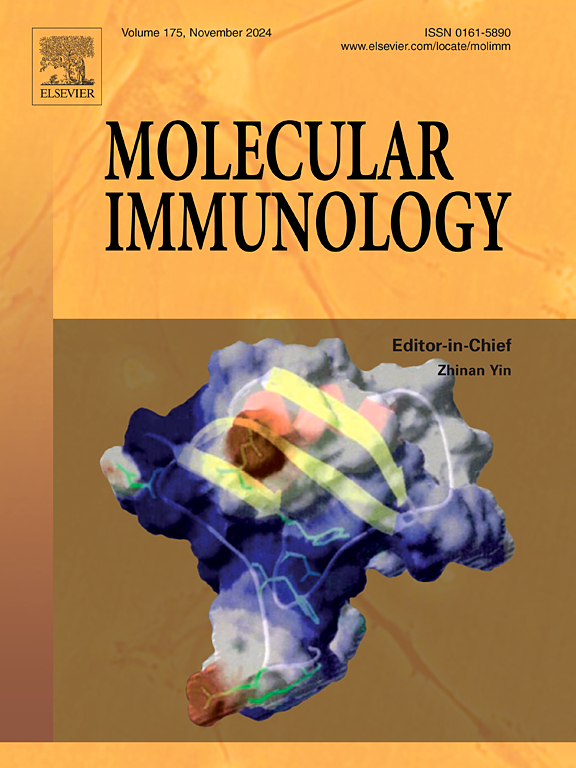白细胞介素1 β单核苷酸多态性与中国汉族系统性红斑狼疮的关系
IF 3
3区 医学
Q2 BIOCHEMISTRY & MOLECULAR BIOLOGY
引用次数: 0
摘要
目的系统性红斑狼疮(SLE)是一种典型的自身免疫性疾病,其病因与遗传因素有关。本研究旨在评估中国汉族人群白细胞介素1β (IL-1β)基因(rs16944、rs1143627、rs1143634)的单核苷酸多态性(snp)与SLE易感性和临床特征之间的关系。方法本研究招募SLE患者155例,对照组140例。从所有受试者的静脉血中提取DNA,用PCR和质谱法进行基因分型。结果在rs16944位点至少有一个突变基因G (AG+GG基因型)、rs1143627位点至少有一个突变基因A (AG+AA基因型)和rs1143634位点至少有一个突变基因A的个体与健康对照组相比,SLE风险较低(P = 0.009;P = 0.005; = 0.016页)。rs16944位点的AG基因型增加了抗ssa (Ro)抗体阳性和血小板减少的风险(P = 0.033;P = 0.018),而G等位基因降低狼疮性肾炎的风险(P = 0.040)。对于rs1143627, A等位基因与狼疮抗凝剂LA2阳性风险增加(P = 0.041)和狼疮肾炎风险降低(P = 0.044)相关,AG基因型与血小板减少风险增加相关(P = 0.009)。rs1143634与SLE临床特征无相关性。结论IL-1β基因多态性与中国人群SLE易感性及临床特征有关。本文章由计算机程序翻译,如有差异,请以英文原文为准。
The relationship between Interleukin 1 beta single nucleotide polymorphisms and systemic lupus erythematosus among the Chinese Han population
Objective
Systemic lupus erythematosus (SLE) is a typical autoimmune disease whose etiology is related to genetic factors. This study is designed to evaluate the association between Single Nucleotide Polymorphisms (SNPs) of the Interleukin 1 beta (IL-1β) gene (rs16944, rs1143627, rs1143634) and SLE susceptibility and clinical characteristics in the Chinese Han population.
Methods
This case-control study recruited 155 SLE patients and 140 controls. DNA was extracted from the venous blood of all subjects and genotyped using PCR and mass spectrometry.
Results
Individuals with at least one mutant gene G (AG+GG genotype) at rs16944, at least one mutant gene A (AG+AA genotype) at rs1143627 and the AG Genotype at rs1143634 were associated with a lower risk of SLE compared to healthy controls(P = 0.009; P = 0.005; P = 0.016). The AG genotype at rs16944 increased the risk of anti-SSA(Ro) antibody positivity and thrombocytopenia (P = 0.033; P = 0.018), while the G allele decreased the risk of lupus nephritis (P = 0.040). For rs1143627, the A allele was linked with an increased risk of LA2 positivity for lupus anticoagulant (P = 0.041) and a lower risk of lupus nephritis (P = 0.044), and the AG genotype was associated with an increased risk of thrombocytopenia (P = 0.009). There was no correlation between rs1143634 and clinical features of SLE.
Conclusion
In conclusion, IL-1β gene polymorphisms are related to SLE susceptibility and clinical features in the Chinese population.
求助全文
通过发布文献求助,成功后即可免费获取论文全文。
去求助
来源期刊

Molecular immunology
医学-免疫学
CiteScore
6.90
自引率
2.80%
发文量
324
审稿时长
50 days
期刊介绍:
Molecular Immunology publishes original articles, reviews and commentaries on all areas of immunology, with a particular focus on description of cellular, biochemical or genetic mechanisms underlying immunological phenomena. Studies on all model organisms, from invertebrates to humans, are suitable. Examples include, but are not restricted to:
Infection, autoimmunity, transplantation, immunodeficiencies, inflammation and tumor immunology
Mechanisms of induction, regulation and termination of innate and adaptive immunity
Intercellular communication, cooperation and regulation
Intracellular mechanisms of immunity (endocytosis, protein trafficking, pathogen recognition, antigen presentation, etc)
Mechanisms of action of the cells and molecules of the immune system
Structural analysis
Development of the immune system
Comparative immunology and evolution of the immune system
"Omics" studies and bioinformatics
Vaccines, biotechnology and therapeutic manipulation of the immune system (therapeutic antibodies, cytokines, cellular therapies, etc)
Technical developments.
 求助内容:
求助内容: 应助结果提醒方式:
应助结果提醒方式:


